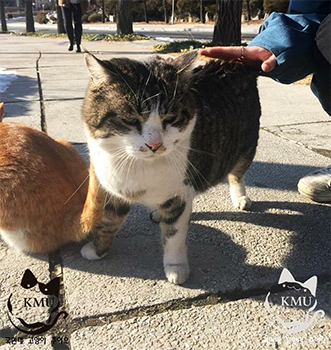
One can easily see feral cats roaming a campus. University students worldwide have raised awareness and contributed to the protection and improvement of these feral cats’ lives. In many countries, including Korea, an increasing number of universities is creating projects and managing clubs to rescue feral cats on campus. Among many such clubs, one of the most intriguing is KMU Cats from Kookmin University, whose story Ewha Voice has sought out.
What initiated the long-term project to protect feral cats on campus was the fall of a young cat from a school building. Lee Eun-ji, the founder of the feral cat club, gathered like-minded students to rescue the injured kitten, which led to the establishment of a long-term, sustainable support club for all feral cats on campus.
“Because the project started with an impending task, we gained much help and support from students, faculty, and even local residents,” said the administrator of KMU Cats. “Ever since KMU Cats’ establishment in 2015, faculty members and local residents have supported us time after time by providing cat food and tidying up cat canteens. We are always grateful to them.”
KMU Cats support the feral cats on campus through a variety of activities. As mentioned above, they take charge in providing the cats with food by installing a cat canteen, a fixed feeding place. Also, with the help of students, alumni, faculty, and local residents, they raise funds to neuter the cats. Members also have sold hand-made merchandise, such as blankets printed with cats, stickers, and calendars, increasing both funds and publicity.
KMU Cats also frequently updates and posts about feral cats on campus through their Facebook page, which receives great attention from other university students as well. KMU Cats has named all of their cats on campus so more students can become familiar with them. Through anonymous posting via social media from students on campus, everyone can be updated on how the cats are doing.
However, being one of the most popular clubs in a university does not mean that the caring for cats is always a joyful experience. KMU Cats also has its difficulties and concerns.
“Our toughest time is when we discover dead cats on campus,” said the administrator. “We volunteer for the disposal because we care, but it certainly is a traumatic experience.”
KMU Cats also mentioned that some students contact them as if the club is the official school department in charge, but as the club is limited in numbers and finance, deciding on the scope of their activities as administrators always comes as a great difficulty.
Nevertheless, since the club is composed of members who love cats, they are happy to actively devote their time and effort to the club.
“We have 30 members, comprised of students from different majors, and we’ve come together with one purpose: to develop symbiotic relationships with feral cats,” the administrator said. “We are so delighted to see the cats growing up in a safe and healthy environment.”
When asked to share advice for managing such a club and taking care of feral cats on campus, KMU Cats gave four tips.
“First, gather the people,” a member of KMU said. “Second, neuter the cats. Third, when deciding on the scope of activities, don’t do anything that will cause damage to the surrounding environment. Last, don’t let it end up as a temporary event. Make it last. If you fail to follow even just one of these tips, you will find yourself held accountable.”
As a pioneering group for supporting feral cats, KMU Cats is continuing to improve the lives of the cats on campus. Hopefully, the future of this club and the feral cats they take care of will continue to improve for as long as they are needed.

